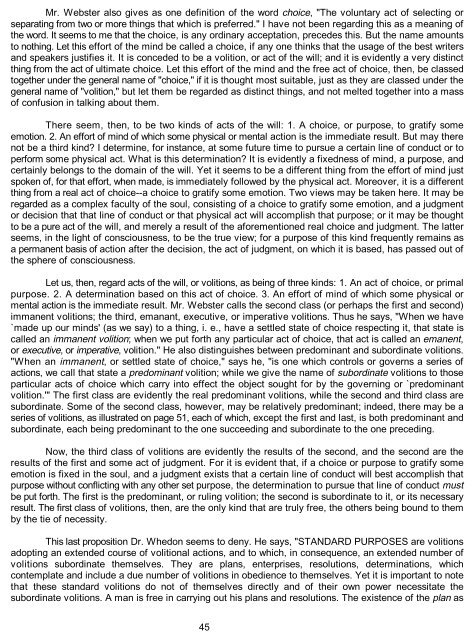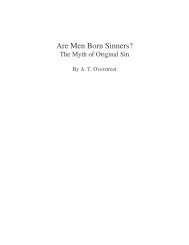Foreknowledge by Joel Hayes - Library of Theology
Foreknowledge by Joel Hayes - Library of Theology
Foreknowledge by Joel Hayes - Library of Theology
Create successful ePaper yourself
Turn your PDF publications into a flip-book with our unique Google optimized e-Paper software.
Mr. Webster also gives as one definition <strong>of</strong> the word choice, "The voluntary act <strong>of</strong> selecting or<br />
separating from two or more things that which is preferred." I have not been regarding this as a meaning <strong>of</strong><br />
the word. It seems to me that the choice, is any ordinary acceptation, precedes this. But the name amounts<br />
to nothing. Let this effort <strong>of</strong> the mind be called a choice, if any one thinks that the usage <strong>of</strong> the best writers<br />
and speakers justifies it. It is conceded to be a volition, or act <strong>of</strong> the will; and it is evidently a very distinct<br />
thing from the act <strong>of</strong> ultimate choice. Let this effort <strong>of</strong> the mind and the free act <strong>of</strong> choice, then, be classed<br />
together under the general name <strong>of</strong> "choice," if it is thought most suitable, just as they are classed under the<br />
general name <strong>of</strong> "volition," but let them be regarded as distinct things, and not melted together into a mass<br />
<strong>of</strong> confusion in talking about them.<br />
There seem, then, to be two kinds <strong>of</strong> acts <strong>of</strong> the will: 1. A choice, or purpose, to gratify some<br />
emotion. 2. An effort <strong>of</strong> mind <strong>of</strong> which some physical or mental action is the immediate result. But may there<br />
not be a third kind? I determine, for instance, at some future time to pursue a certain line <strong>of</strong> conduct or to<br />
perform some physical act. What is this determination? It is evidently a fixedness <strong>of</strong> mind, a purpose, and<br />
certainly belongs to the domain <strong>of</strong> the will. Yet it seems to be a different thing from the effort <strong>of</strong> mind just<br />
spoken <strong>of</strong>, for that effort, when made, is immediately followed <strong>by</strong> the physical act. Moreover, it is a different<br />
thing from a real act <strong>of</strong> choice--a choice to gratify some emotion. Two views may be taken here. It may be<br />
regarded as a complex faculty <strong>of</strong> the soul, consisting <strong>of</strong> a choice to gratify some emotion, and a judgment<br />
or decision that that line <strong>of</strong> conduct or that physical act will accomplish that purpose; or it may be thought<br />
to be a pure act <strong>of</strong> the will, and merely a result <strong>of</strong> the aforementioned real choice and judgment. The latter<br />
seems, in the light <strong>of</strong> consciousness, to be the true view; for a purpose <strong>of</strong> this kind frequently remains as<br />
a permanent basis <strong>of</strong> action after the decision, the act <strong>of</strong> judgment, on which it is based, has passed out <strong>of</strong><br />
the sphere <strong>of</strong> consciousness.<br />
Let us, then, regard acts <strong>of</strong> the will, or volitions, as being <strong>of</strong> three kinds: 1. An act <strong>of</strong> choice, or primal<br />
purpose. 2. A determination based on this act <strong>of</strong> choice. 3. An effort <strong>of</strong> mind <strong>of</strong> which some physical or<br />
mental action is the immediate result. Mr. Webster calls the second class (or perhaps the first and second)<br />
immanent volitions; the third, emanant, executive, or imperative volitions. Thus he says, "When we have<br />
`made up our minds' (as we say) to a thing, i. e., have a settled state <strong>of</strong> choice respecting it, that state is<br />
called an immanent volition; when we put forth any particular act <strong>of</strong> choice, that act is called an emanent,<br />
or executive, or imperative, volition." He also distinguishes between predominant and subordinate volitions.<br />
"When an immanent, or settled state <strong>of</strong> choice," says he, "is one which controls or governs a series <strong>of</strong><br />
actions, we call that state a predominant volition; while we give the name <strong>of</strong> subordinate volitions to those<br />
particular acts <strong>of</strong> choice which carry into effect the object sought for <strong>by</strong> the governing or `predominant<br />
volition.'" The first class are evidently the real predominant volitions, while the second and third class are<br />
subordinate. Some <strong>of</strong> the second class, however, may be relatively predominant; indeed, there may be a<br />
series <strong>of</strong> volitions, as illustrated on page 51, each <strong>of</strong> which, except the first and last, is both predominant and<br />
subordinate, each being predominant to the one succeeding and subordinate to the one preceding.<br />
Now, the third class <strong>of</strong> volitions are evidently the results <strong>of</strong> the second, and the second are the<br />
results <strong>of</strong> the first and some act <strong>of</strong> judgment. For it is evident that, if a choice or purpose to gratify some<br />
emotion is fixed in the soul, and a judgment exists that a certain line <strong>of</strong> conduct will best accomplish that<br />
purpose without conflicting with any other set purpose, the determination to pursue that line <strong>of</strong> conduct must<br />
be put forth. The first is the predominant, or ruling volition; the second is subordinate to it, or its necessary<br />
result. The first class <strong>of</strong> volitions, then, are the only kind that are truly free, the others being bound to them<br />
<strong>by</strong> the tie <strong>of</strong> necessity.<br />
This last proposition Dr. Whedon seems to deny. He says, "STANDARD PURPOSES are volitions<br />
adopting an extended course <strong>of</strong> volitional actions, and to which, in consequence, an extended number <strong>of</strong><br />
volitions subordinate themselves. They are plans, enterprises, resolutions, determinations, which<br />
contemplate and include a due number <strong>of</strong> volitions in obedience to themselves. Yet it is important to note<br />
that these standard volitions do not <strong>of</strong> themselves directly and <strong>of</strong> their own power necessitate the<br />
subordinate volitions. A man is free in carrying out his plans and resolutions. The existence <strong>of</strong> the plan as<br />
45






